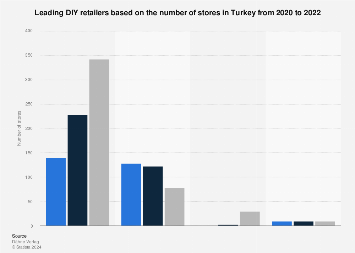UK DIY Retailers: The Best And Worst Revealed

Table of Contents
Top-Performing UK DIY Retailers: Quality, Selection, and Service
Choosing the right UK DIY retailer can significantly impact your project's success. Here are some of the top performers known for their quality, selection, and service:
B&Q: A DIY Giant's Strengths and Weaknesses
B&Q is a household name synonymous with DIY in the UK. Its strengths lie in its extensive product range, competitive pricing, and convenient locations across the country. B&Q also boasts a strong online presence, offering click and collect and home delivery services. However, like any large retailer, it has its downsides.
-
Pros:
- Wide product range covering all aspects of home improvement, from basic tools to specialist equipment.
- Generally competitive pricing, often featuring special offers and discounts.
- Extensive network of stores making it easily accessible for most customers.
- Robust online presence with a user-friendly website and mobile app, offering easy browsing and ordering.
-
Cons:
- Stores can be crowded, especially during peak times, leading to long queues and a less pleasant shopping experience.
- Customer service quality can be inconsistent across different stores.
- Occasional stock issues, particularly for popular items.
Wickes: A Strong Competitor with a Focus on Value
Wickes presents a strong challenge to B&Q, particularly focusing on providing good value for money. They often have competitive pricing on DIY supplies and consistently offer promotions. Their online presence is strong, with a well-designed website and reliable click and collect service.
-
Pros:
- Excellent value for money on a wide range of DIY products.
- Strong online presence with a convenient click and collect option.
- Generally positive customer reviews highlighting good value and helpful staff.
-
Cons:
- Product range may be slightly smaller than B&Q's in certain categories.
- Fewer store locations than B&Q in some regions of the UK.
Homebase: A Resurgence in the Market?
Homebase has undergone a period of transformation and is now showing signs of a market resurgence. While it may not yet rival B&Q or Wickes in sheer scale, it's making improvements in its product range and customer service. Its online presence is also growing.
-
Pros:
- Improved product selection, particularly in garden supplies and home décor.
- Reports of better customer service in recent years.
- Expanding online presence and delivery options.
-
Cons:
- Still recovering from past challenges and may not match the overall breadth of B&Q or Wickes.
Underperforming UK DIY Retailers: Areas for Improvement
While highlighting specific underperforming retailers requires consistent negative evidence, some common issues plague certain UK DIY stores. These issues can lead to disappointing DIY shopping experiences and should be avoided.
- Poor online shopping experiences: Slow delivery times, website glitches, and inadequate customer support online are major detractors.
- Limited product range or selection: Lack of choice can force customers to shop elsewhere for specific items.
- Inconsistent or poor customer service: unhelpful or unfriendly staff can make the DIY shopping experience frustrating.
- High prices compared to competitors: Overpriced products discourage customers from returning.
Factors to Consider When Choosing a UK DIY Retailer
Selecting the best UK DIY retailer involves carefully weighing several crucial factors:
Price vs. Quality: Finding the Right Balance
Balancing cost and quality is vital for successful DIY projects. While budget-friendly options are appealing, compromising on quality can lead to costly mistakes and delays down the line. Researching product reviews and comparing prices across different retailers can help you find the sweet spot between affordability and durability.
Location and Convenience
Consider the location of stores relative to your home or project site. Convenience is key – easily accessible stores save time and effort. Click and collect services and reliable home delivery options can also significantly enhance the shopping experience.
Online vs. In-Store Shopping Experience
Both online and in-store shopping have their pros and cons. Online shopping offers convenience and extensive product information, while in-store shopping allows you to inspect products and get immediate assistance. Consider your preferences and the specific needs of your project when deciding which approach suits you best.
Conclusion: Making Informed Choices in the UK DIY Market
Choosing the right UK DIY retailer can significantly impact your DIY project’s success and enjoyment. This guide highlights the strengths and weaknesses of major players, emphasizing the importance of factors such as price, product range, customer service, and convenience. Before starting your next DIY project, use this guide to choose the best UK DIY retailer to suit your needs and budget. Happy DIYing!

Featured Posts
-
 Du Dry January A La Tournee Minerale Bienfaits Pour La Sante Et L Industrie Du Sans Alcool
Apr 23, 2025
Du Dry January A La Tournee Minerale Bienfaits Pour La Sante Et L Industrie Du Sans Alcool
Apr 23, 2025 -
 Yankees Cortes Throws Gem Blanks Reds
Apr 23, 2025
Yankees Cortes Throws Gem Blanks Reds
Apr 23, 2025 -
 Walk Off Bunt Sinks Royals In 11 Inning Loss To Brewers
Apr 23, 2025
Walk Off Bunt Sinks Royals In 11 Inning Loss To Brewers
Apr 23, 2025 -
 Detroit Tigers Protest Plate Umpires Decision Requesting Video Evidence From Mlb
Apr 23, 2025
Detroit Tigers Protest Plate Umpires Decision Requesting Video Evidence From Mlb
Apr 23, 2025 -
 Trumps Tariff Turmoil Where Can Canadian Households Find Relief
Apr 23, 2025
Trumps Tariff Turmoil Where Can Canadian Households Find Relief
Apr 23, 2025
